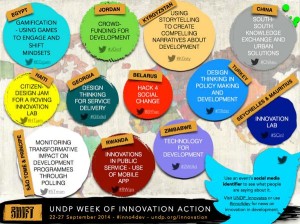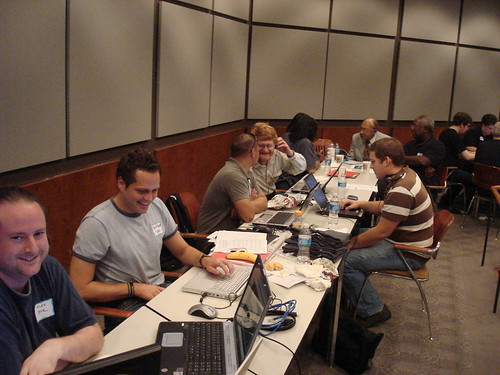The change is stunning. And welcomed.
Back in 2001, my first year working as an employee of the United Nations, I was a part of a little department of six people (and various interns over the years) within UNDP/UN Volunteers, managing two projects: the Online Volunteering service (then part of NetAid) and the Secretary General’s United Nations Information Technology Service (UNITeS). Our team could not have been more excited to talk about virtual volunteering, technology for development (ICT4D), ICT4D projects by volunteers in the field, handheld computer technologies in community service/volunteering/advocacy, citizen-designed tech solutions, using tech to work with remote volunteers, crowd-sourcing for development (though we didn’t call it that then), south-to-south knowledge exchange ONLINE, hacks 4 social change (though we didn’t call it then), and other tech4good activities to anyone who would listen! It was an incredible four years of my life.
Unfortunately, many of our UN colleagues never understood our projects – or our boundless enthusiasm for such. Despite our events, workshops, one-on-one meetings, online resources, singing and dancing, drums, support from the Secretary General, Kofi Annan, whatever else we could think of, our activities were met with eye rolls by many of our colleagues. By the time I left that assignment, the new head of UNV (now long-gone) was proudly proclaiming that most of our initiative’s activities, save the online volunteering service, were finished – not because they had met their goals, but because they weren’t needed, and never had been. Even the UNITeS web site was taken off-line for a few months (hence why I keep a version here). Our team went its separate ways.
 Now, 13 years after we came together in Bonn, Germany and tried to get the rest of the UN excited about our crazy ideas, and nine years after most of our activities were ended, it’s fascinating to see UNDP in particular fully embracing those ideas: The UNDP SHIFT campaign, focused on innovation (and many of the ideas we tried to promote back at the start of the century – see graphic at left), is the week of 22 September 2014, headquartered in New York City (the “Social Good” summit) but happening all over the world, including here in Kyiv, Ukraine (details soon!).
Now, 13 years after we came together in Bonn, Germany and tried to get the rest of the UN excited about our crazy ideas, and nine years after most of our activities were ended, it’s fascinating to see UNDP in particular fully embracing those ideas: The UNDP SHIFT campaign, focused on innovation (and many of the ideas we tried to promote back at the start of the century – see graphic at left), is the week of 22 September 2014, headquartered in New York City (the “Social Good” summit) but happening all over the world, including here in Kyiv, Ukraine (details soon!).
We can’t take any credit for this change happening, of course. But my colleagues can feel good to know that we weren’t quite as crazy as people thought we were – we we really were on to something worth pursuing by the UN. We were just a decade or so early!
(although… we were pretty crazy…)


 In a conversation with a friend participating in
In a conversation with a friend participating in 